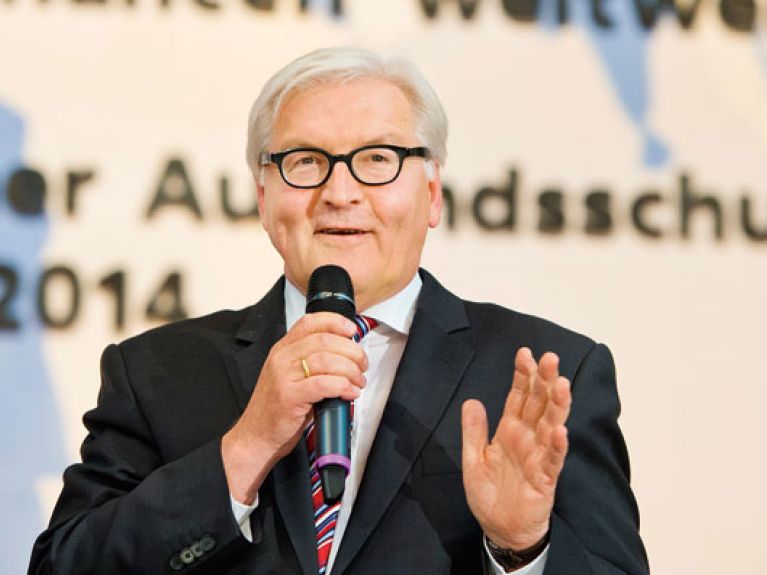Partners for the future
German schools abroad achieve outstanding results – the Federal Foreign Office supports their international network.

The enthusiasm, commitment and openness were all very noticeable during the three summer days on which the fourth World Congress of German Schools Abroad was held at the Federal Foreign Office and the House of World Cultures in Berlin. In addition to roughly 450 trustees, principals and administrators from 141 German schools abroad, the specialist advisors of the Central Agency for Schools Abroad (ZfA) and representatives of the approximately 1,100 international schools that offer the German Language Diploma (DSD schools) took part in the World Congress for the first time in 2014. They were able to exchange views not only among themselves, but also with representatives from the fields of education, industry, research and politics. The latter left no one in Berlin in any doubt about what the schools mean to them. For example, Federal Foreign Minister Frank-Walter Steinmeier described the work of German schools abroad as a “fundamental element of German foreign policy”.
Why are these schools held in such high esteem? During his opening speech at the World Congress, Steinmeier made it clear that they are important partners in Germany’s dialogue with other countries: “Our networking with the world is a ‘two-way street’. It changes the world, but it also changes our country. And that is why I believe international education policy means not only learning for the world, but also learning from the world.” German schools abroad want to be centres of encounter and of intercultural dialogue. They have long offered more than high-quality education for the children of Germans who work abroad. The vast majority give students from very different host countries and cultural circles an understanding of German culture and language: shared learning as the basis for a shared future.
Almost four-fifths of the students at German schools abroad now come from the host countries. As a rule, they leave school with a German school qualification and a qualification from the host country. Many use their Abitur to study at a German university, and their ties with Germany often continue throughout their working lives. Networks develop from which both side benefit: in economic relations, in cultural exchange or in political dialogue. The network idea is a global trend. At the World Congress Frank- Walter Steinmeier also spoke about the Review 2014 project, which asked numerous international experts about their expectations of German foreign policy. The replies, explained Steinmeier, included repeated references to terms like “intermediary, bridge builder, intercultural sensitivity and understanding”. Steinmeier already made it clear that schools can play an important role in this area during his first term as Federal Foreign Minister between 2005 and 2009.
In 2008, the Federal Foreign Office launched an initiative called Schools: Partners for the Future (PASCH), which began building a global network of international schools where German is taught. Since 2008, the number of German schools abroad has increased from 117 to 141 and the number of DSD schools has risen from 440 to 1,072. German schools abroad and DSD schools receive support from the ZfA. The network also includes FIT schools, which were introduced as part of the PASCH initiative: 584 of these schools in different national education systems are introducing or expanding the teaching of German. These schools receive support from the Goethe-Institut. If you add all this together, the scale of the commitment becomes clear: the number of schools that the Federal Foreign Office supports as part of its educational effort abroad has risen from roughly 550 to nearly 1,800 since 2008. They come together under the PASCH umbrella to engage in dialogue and to network in a variety of ways. The German Academic Exchange Service (DAAD) scholarship programme for former students of German schools abroad, DSD schools and FIT schools has also been substantially expanded as part of the PASCH initiative. Scholarships for a complete study programme in Germany were advertised worldwide for the first time, and their number has been doubled from 60 to 120. “We urgently need talented young people,” emphasises Federal Foreign Minister Steinmeier.
German schools abroad can create a valuable foundation here by communicating a multilayered image of modern Germany and the German language. As a result, the schools will become mainstays of the culture of welcome that the Federal Government would like to cultivate in coming years. The fact that Germany has no interest whatsoever in talent shortages in the partner countries is equally important to Frank-Walter Steinmeier: “Many of the people we train will make a mark in their own countries, change their societies and bear responsibility in the world.” At the World Congress of German Schools Abroad, Sylvia Löhrmann, President of the Education Ministers Conference, emphasised that Germany was also ready to “provide stronger support for vocational education initiatives at German school abroad in the future”. This applies not only against the background of a shortage of skilled specialists, but also against the background of the dramatically high youth unemployment in the countries most severely affected by the recent European economic and financial crisis.
If the idea behind the PASCH initiative, the idea that schools are “partners for the future”, is to continue to develop in many different areas over coming years, it needs a solid foundation. This has been created by the German Schools Abroad Act that came into effect in 2014. Support for German schools abroad received its own statutory basis for the first time, and schools with large numbers of successful students now have a secure entitlement to funding. Fundamentally, German schools abroad were granted greater budget autonomy, and support for DSD schools was written into law for the first time. Frank-Walter Steinmeier succinctly summed up the spirit and purpose of the German Schools Abroad Act: “All this has one clear goal: creating the foundations that will enable our schools abroad to grow.” ▪
